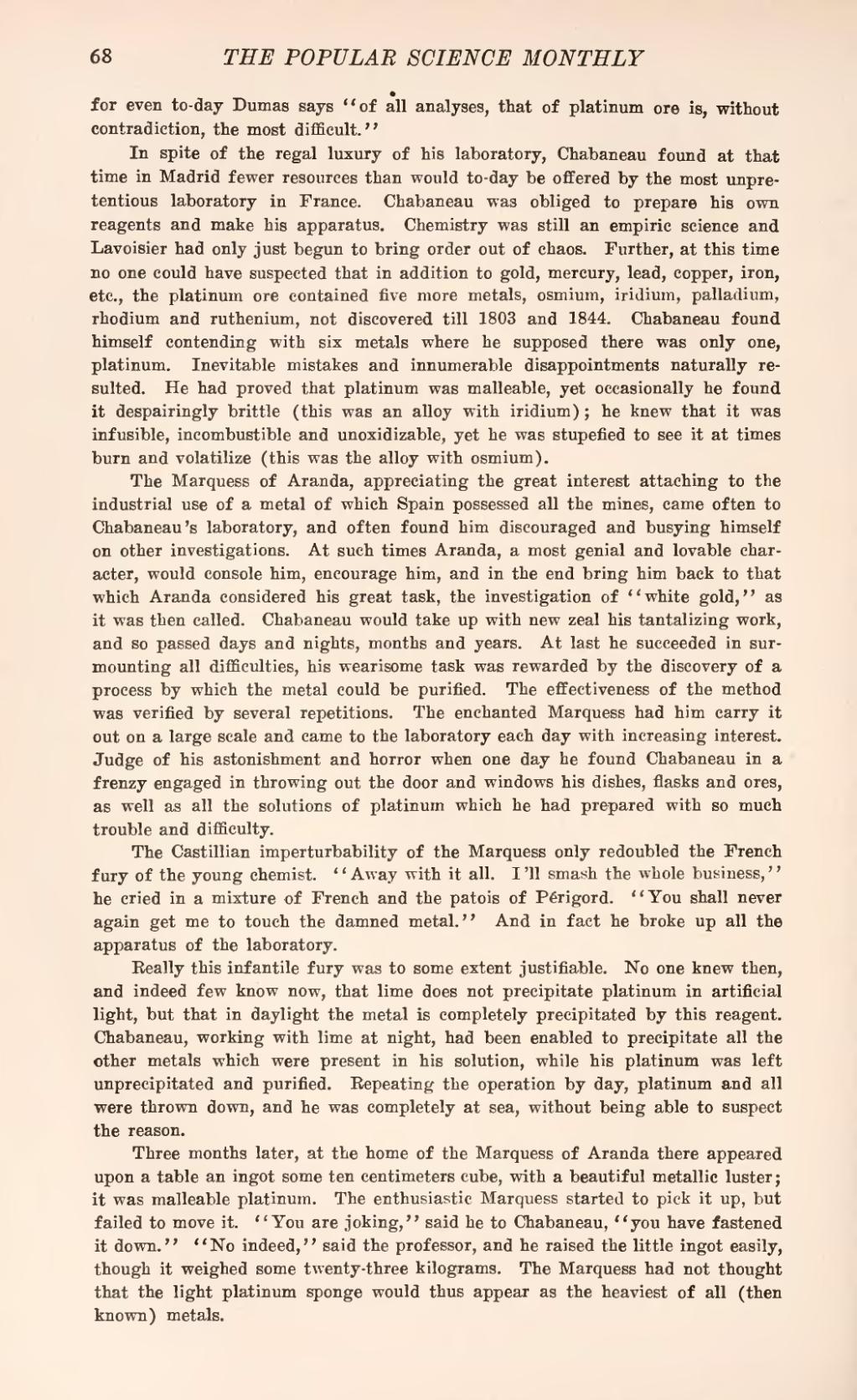for even to-day Dumas says "of all analyses, that of platinum ore is, without contradiction, the most difficult."
In spite of the regal luxury of his laboratory, Chabaneau found at that time in Madrid fewer resources than would to-day be offered by the most unpretentious laboratory in France. Chabaneau was obliged to prepare his own reagents and make his apparatus. Chemistry was still an empiric science and Lavoisier had only just begun to bring order out of chaos. Further, at this time no one could have suspected that in addition to gold, mercury, lead, copper, iron, etc., the platinum ore contained five more metals, osmium, iridium, palladium, rhodium and ruthenium, not discovered till 1803 and 1844. Chabaneau found himself contending with six metals where he supposed there was only one, platinum. Inevitable mistakes and innumerable disappointments naturally resulted. He had proved that platinum was malleable, yet occasionally he found it despairingly brittle (this was an alloy with iridium); he knew that it was infusible, incombustible and unoxidizable, yet he was stupefied to see it at times burn and volatilize (this was the alloy with osmium).
The Marquess of Aranda, appreciating the great interest attaching to the industrial use of a metal of which Spain possessed all the mines, came often to Chabaneau's laboratory, and often found him discouraged and busying himself on other investigations. At such times Aranda, a most genial and lovable character, would console him, encourage him, and in the end bring him back to that which Aranda considered his great task, the investigation of "white gold," as it was then called. Chabaneau would take up with new zeal his tantalizing work, and so passed days and nights, months and years. At last he succeeded in surmounting all difficulties, his wearisome task was rewarded by the discovery of a process by which the metal could be purified. The effectiveness of the method was verified by several repetitions. The enchanted Marquess had him carry it out on a large scale and came to the laboratory each day with increasing interest. Judge of his astonishment and horror when one day he found Chabaneau in a frenzy engaged in throwing out the door and windows his dishes, flasks and ores, as well as all the solutions of platinum which he had prepared with so much trouble and difficulty.
The Castillian imperturbability of the Marquess only redoubled the French fury of the young chemist. "Away with it all. I'll smash the whole business," he cried in a mixture of French and the patois of P€rigord. "You shall never again get me to touch the damned metal." And in fact he broke up all the apparatus of the laboratory.
Really this infantile fury was to some extent justifiable. No one knew then, and indeed few know now, that lime does not precipitate platinum in artificial light, but that in daylight the metal is completely precipitated by this reagent. Chabaneau, working with lime at night, had been enabled to precipitate all the other metals which were present in his solution, while his platinum was left unprecipitated and purified. Repeating the operation by day, platinum and all were thrown down, and he was completely at sea, without being able to suspect the reason.
Three months later, at the home of the Marquess of Aranda there appeared upon a table an ingot some ten centimeters cube, with a beautiful metallic luster; it was malleable platinum. The enthusiastic Marquess started to pick it up, but failed to move it. "You are joking," said he to Chabaneau, "you have fastened it down." "No indeed," said the professor, and he raised the little ingot easily, though it weighed some twenty-three kilograms. The Marquess had not thought that the light platinum sponge would thus appear as the heaviest of all (then known) metals.
